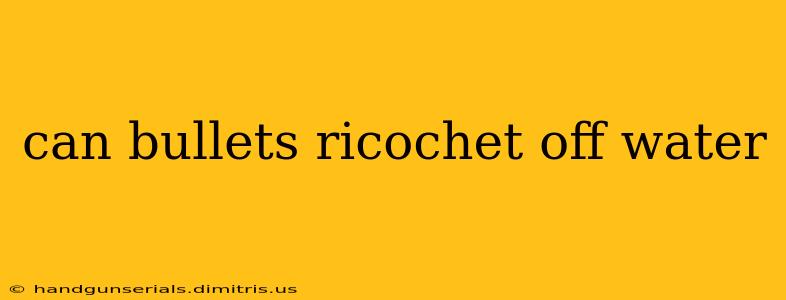Can Bullets Ricochet Off Water? The Surprising Physics of Projectile Impact
The question of whether bullets can ricochet off water is more complex than a simple yes or no. While the common image conjures up scenes from action movies, the reality involves a fascinating interplay of physics, projectile characteristics, and water conditions. The answer, therefore, is sometimes.
Understanding the Physics of Ricochet
Ricochet, in its simplest form, occurs when a projectile strikes a surface at a glancing angle, causing it to deflect rather than penetrate. This depends heavily on several factors:
-
Angle of Impact: A shallow angle is crucial. A bullet striking the water at a steep angle is far more likely to penetrate or simply splash. The shallower the angle, the greater the chance of deflection.
-
Bullet Velocity and Mass: A high-velocity, heavier bullet carries more kinetic energy. This energy is critical for overcoming the water's resistance. While a slower bullet might simply sink, a fast, heavy bullet has a better chance of ricocheting. The bullet's shape also plays a role; a more aerodynamic projectile might skim more effectively.
-
Water Density and Conditions: The density of the water is a major factor. Cold, dense water provides more resistance, reducing the likelihood of a ricochet compared to warmer, less dense water. The presence of waves, currents, or even surface tension can also significantly alter the trajectory.
-
Bullet Material and Construction: The bullet's material (lead, copper, etc.) and its construction (full metal jacket, hollow point, etc.) impact how it interacts with water. Different materials offer varying degrees of resistance to deformation.
Why Ricochets Are Less Common Than You Might Think
Despite the factors contributing to the possibility of a ricochet, several reasons make this event relatively infrequent:
-
Water's Density: Water, while a fluid, offers considerable resistance to penetration. A bullet expends significant energy overcoming this resistance, reducing the energy available for deflection.
-
Energy Transfer: A significant portion of the bullet's energy is transferred into the water itself, creating cavitation (the formation of bubbles) and dissipating energy rather than causing deflection.
-
Unpredictability: The water's surface is not a static plane. Waves, ripples, and currents introduce significant unpredictability into the bullet's trajectory after impact, making accurate prediction of ricochet paths nearly impossible.
Practical Implications and Safety
The unpredictable nature of bullet ricochets from water necessitates extreme caution. Assuming a bullet will simply sink or harmlessly splash is reckless. The potential for unexpected deflection poses a severe danger to those nearby. It's crucial to remember that even if a ricochet doesn't occur, a bullet fired into water can still cause significant damage due to the hydrostatic pressure created on impact.
Conclusion
While bullets can ricochet off water under specific conditions, it's not a guaranteed outcome. The numerous variables involved make prediction unreliable, highlighting the significant dangers associated with firing firearms near or into water. Safety should always be the paramount concern. Never underestimate the unpredictable behavior of projectiles, and always prioritize responsible firearm handling.

